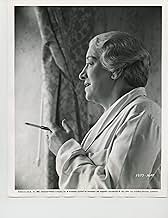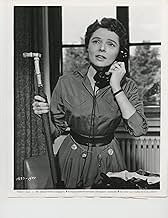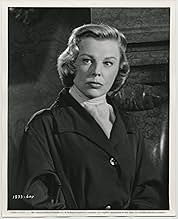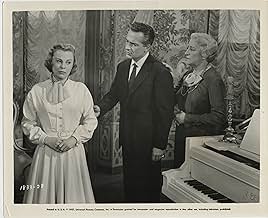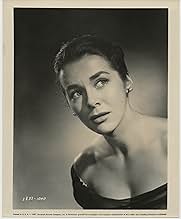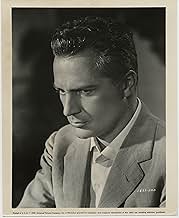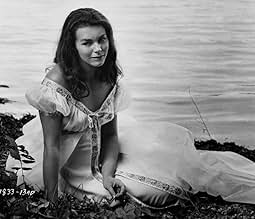VALUTAZIONE IMDb
6,2/10
595
LA TUA VALUTAZIONE
Una giovane donna americana si reca a Monaco e si innamora di un famoso direttore d'orchestra tedesco, solo per scoprire che ha una moglie malata di mente.Una giovane donna americana si reca a Monaco e si innamora di un famoso direttore d'orchestra tedesco, solo per scoprire che ha una moglie malata di mente.Una giovane donna americana si reca a Monaco e si innamora di un famoso direttore d'orchestra tedesco, solo per scoprire che ha una moglie malata di mente.
- Regia
- Sceneggiatura
- Star
Marianne Koch
- Reni Fischer
- (as Marianne Cook)
Paul Cavanagh
- Dr. Ashley
- (non citato nei titoli originali)
Recensioni in evidenza
5fs3
Throughout the 50's, Universal-International was home to most of director Douglas Sirk's striking views of life, love and heartache among the American classes. His work with Rock Hudson, Dorothy Malone, Barbara Stanwyck and others in superior films like Written on The Wind, The Tarnished Angels and There's Always Tomorrow is not matched here.
June Allyson on occasion was able to break free from her standard persona with the fortuitous help of the right co-star, director, script turn or moment in time. Here the noble suffering and Rossano Brazzi do not provide the right formula. The stars try (probably too hard) and the trappings are predictably pretty, but the whole affair is rather unfortunately empty.
June Allyson on occasion was able to break free from her standard persona with the fortuitous help of the right co-star, director, script turn or moment in time. Here the noble suffering and Rossano Brazzi do not provide the right formula. The stars try (probably too hard) and the trappings are predictably pretty, but the whole affair is rather unfortunately empty.
June Allyson made a career in Hollywood by being the girl next door. She wasn't the lovely girl next door, she was the pug face even the most unremarkable and unattractive could relate to.
She was an awful singer and a mediocre actress. The studios over groomed her. When her career started waning, she married producer Dick Powell which brought her another ten years of work. In Interlude she plays her tired girl next door schtick at the age of 39.
This film was made during the height of the fear of television eating into film ticket sales. Hence the glossy photography and stunning German locations. The script and cast are its drawbacks.
She was an awful singer and a mediocre actress. The studios over groomed her. When her career started waning, she married producer Dick Powell which brought her another ten years of work. In Interlude she plays her tired girl next door schtick at the age of 39.
This film was made during the height of the fear of television eating into film ticket sales. Hence the glossy photography and stunning German locations. The script and cast are its drawbacks.
A pretty Girl Takes a Job in overseas and meets the charming psychiatrist Morley Dwyer, who isn't from germany either.
Sehr wears a white dress, almost like a bride. So He has the Impression, she ist looking for a 'husband'. And she meets one: Tonio Fisher, a conductor, is soon quite involved, when she met him - she went to see the ego-oriented fellow in his/their place - an old fashioned but impressive landhouse. There she meets his family too. As it turns out - after a stormy night - he is alredy engaged. But the lady in his side seems not happy. In fact, she s about to fight for her future too. Perhaps it' s difficult to just let go, even of there is some other interests, a woman ist left Into (or should I say: left alone?) But it's perhaps the Background, he needs for being the artist...
Sehr wears a white dress, almost like a bride. So He has the Impression, she ist looking for a 'husband'. And she meets one: Tonio Fisher, a conductor, is soon quite involved, when she met him - she went to see the ego-oriented fellow in his/their place - an old fashioned but impressive landhouse. There she meets his family too. As it turns out - after a stormy night - he is alredy engaged. But the lady in his side seems not happy. In fact, she s about to fight for her future too. Perhaps it' s difficult to just let go, even of there is some other interests, a woman ist left Into (or should I say: left alone?) But it's perhaps the Background, he needs for being the artist...
As soon as Douglas Sirk's "Interlude" opened to a theme sung by the MacGuire Sisters, I knew that we were not in typical Sirk territory anymore. Usually, the pairing of director Sirk and producer Ross Hunter brought forth brooding melodrama and biting social commentary. However, somewhere here things go sour. June Allyson fails in her efforts to bring epic emotion to the screen and the entire film lacks any real sense of heart and soul. The romantic leading man, Rossano Brazzi, thankfully brings some continental sophistication and feeling to the proceedings. But nothing really saves this movie from becoming a flaccid piece of 1950s celluloid.
Allyson stars as an American visiting Munich, Germany. She happens to meet a bad-tempered conductor(Brazzi), with an even more poorly-tempered wife. His wife suffers from mental illness which drives Brazzi away from her and into Allyson's arms. Allyson, meanwhile, is also being courted by an American doctor without all of the extra baggage. Allyson is torn between the two men and must make a decision before she heads back home to the U.S.
June Allyson was a poor choice as a leading lady for Sirk. Any number of his other female stars would have been great for the role. But, Allyson? I just don't get it. Besides that, she and Brazzi have absolutely no chemistry. There is not one moment in the film where I wanted to see them end up together. The highlights of this film are the lovely scenes shot against the backdrop of a post-war Europe. Also of note for Sirk fans is the heavy use of reflective surfaces and shadows - common imagery in Sirk movies. In the end, however, Sirk, Hunter and the music of Frank Skinner fail to produce anything of substance. Forgettable and slightly disappointing. The 1968 British version of "Interlude" is far superior and highly recommended.
Allyson stars as an American visiting Munich, Germany. She happens to meet a bad-tempered conductor(Brazzi), with an even more poorly-tempered wife. His wife suffers from mental illness which drives Brazzi away from her and into Allyson's arms. Allyson, meanwhile, is also being courted by an American doctor without all of the extra baggage. Allyson is torn between the two men and must make a decision before she heads back home to the U.S.
June Allyson was a poor choice as a leading lady for Sirk. Any number of his other female stars would have been great for the role. But, Allyson? I just don't get it. Besides that, she and Brazzi have absolutely no chemistry. There is not one moment in the film where I wanted to see them end up together. The highlights of this film are the lovely scenes shot against the backdrop of a post-war Europe. Also of note for Sirk fans is the heavy use of reflective surfaces and shadows - common imagery in Sirk movies. In the end, however, Sirk, Hunter and the music of Frank Skinner fail to produce anything of substance. Forgettable and slightly disappointing. The 1968 British version of "Interlude" is far superior and highly recommended.
June varies from her girl next door image, as she plays Helen Banning, a young woman from Philadelphia who travels to Munich not for romance, but for her career and then gets romantically involved with two men, one of them married!
You don't know who to sympathize with more, as all the members of this quadrangle bring out your compassion. There's Helen, whose head is telling her she'd be better off with Dr. Morley Dwyer (Keith Andes), also from Philly and also in Munich form his career, while her heart is pulling her toward Tonio Fischer (Rossano Brazzi), a famous composer whose wife is mentally ill. There's Tonio, who lives with memories of his once happy marriage, yet wants to grab some present happiness for himself. You also feel for Morley, who's fallen for Helen and tries to make her see reason, doesn't want to give up yet may have to admit defeat. And there's Reni Fischer (Marianne Koch), aware of her illness in her lucid moments and suffering because of it, still very much in love with the husband she doesn't want to lose.
This is a no-win situation if ever there was one, as there's no way someone isn't going to get hurt.
I won't give anything away, except to say that, had this movie been made in Pre-Code days, it might have ended differently.
You don't know who to sympathize with more, as all the members of this quadrangle bring out your compassion. There's Helen, whose head is telling her she'd be better off with Dr. Morley Dwyer (Keith Andes), also from Philly and also in Munich form his career, while her heart is pulling her toward Tonio Fischer (Rossano Brazzi), a famous composer whose wife is mentally ill. There's Tonio, who lives with memories of his once happy marriage, yet wants to grab some present happiness for himself. You also feel for Morley, who's fallen for Helen and tries to make her see reason, doesn't want to give up yet may have to admit defeat. And there's Reni Fischer (Marianne Koch), aware of her illness in her lucid moments and suffering because of it, still very much in love with the husband she doesn't want to lose.
This is a no-win situation if ever there was one, as there's no way someone isn't going to get hurt.
I won't give anything away, except to say that, had this movie been made in Pre-Code days, it might have ended differently.
Lo sapevi?
- QuizA Los Angeles Times newspaper ad from Oct. 1957 shows that Universal Pictures widely distributed this film as "Forbidden Interlude" on a double bill with L'uomo dai mille volti (1957) starring James Cagney.
- ConnessioniReferenced in Behind the Mirror: A Profile of Douglas Sirk (1979)
I più visti
Accedi per valutare e creare un elenco di titoli salvati per ottenere consigli personalizzati
- How long is Interlude?Powered by Alexa
Dettagli
- Tempo di esecuzione1 ora 30 minuti
- Proporzioni
- 2.35 : 1
Contribuisci a questa pagina
Suggerisci una modifica o aggiungi i contenuti mancanti

Divario superiore
By what name was Interludio (1957) officially released in India in English?
Rispondi
